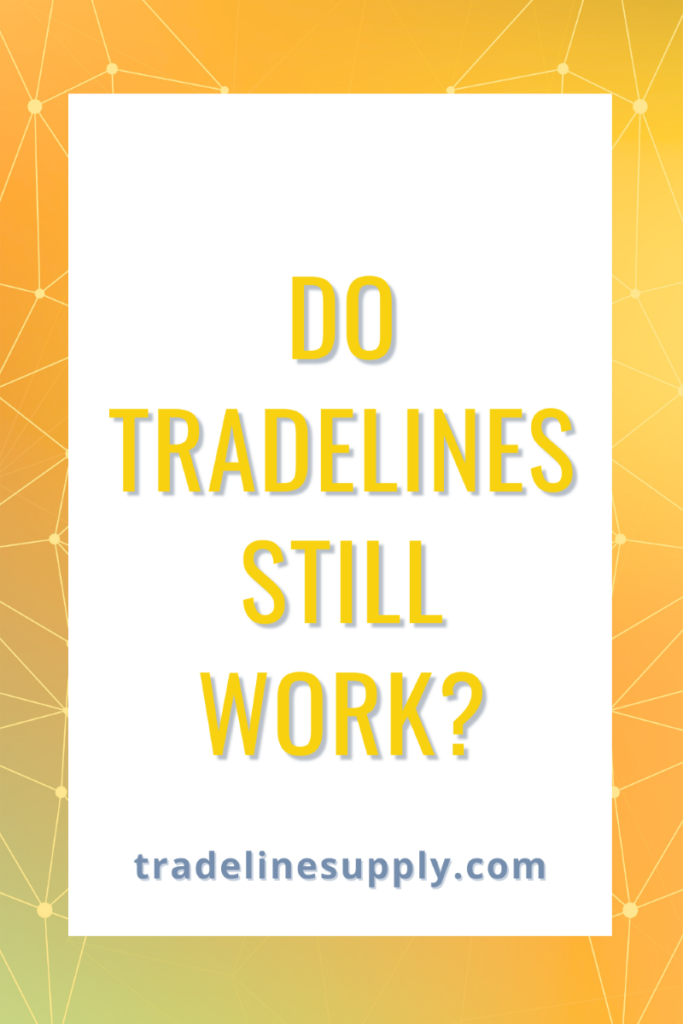Do Tradelines Still Work in 2024?

How to Grow Your Savings Rate
12/01/2023
Easy Credit Hacks That Will Actually Get You Results
12/07/2023
One question we often hear in the tradeline industry is “Do tradelines still work in 2024?”
Fortunately, we can say with certainty that tradelines do still work in 2024, and we are confident they will continue to be effective for years to come.
In 2024, Tradeline Supply Company, LLC continues to guarantee authorized user tradeline postings for 2 out of 3 major credit bureaus. Read more about our tradeline guarantees.
Disclaimer: Tradeline Supply Company, LLC is not a credit repair company, and does not advertise the authorized user tradeline product for the purpose of boosting credit scores. Its products do not directly impact credit scores. There is no guarantee of any improvements to credit in any way.
To explain our answer, we will delve into the history of authorized user tradelines and the policies that regulate the tradeline industry.
Why Do Tradelines Work?
Although the term “tradeline” could refer to any account in your credit file, usually in our industry people use the word as shorthand for authorized user tradelines, or accounts on which you are an authorized user.
Credit card companies allow cardholders to add authorized users (AUs) to their accounts, which are people who are authorized to use the account but are not liable for any charges incurred. For example, a business owner could add an employee as an AU of their credit card, or a parent could add their child.
When someone is added as an AU, often the full history of the account is shown in the credit reports of both the primary user and the AU, regardless of when the AU was added to the account. Therefore, the AU may have years of credit history associated with the account reflected in their file as soon as they are added.
This is why obtaining an AU tradeline through a family member or friend is a common way for people to start establishing a credit history. In fact, studies estimate that 20%-30% of Americans have at least one AU account.
Why are authorized users able to share the benefits of the primary user’s credit rating, even though they are not liable for the debt? This policy is a result of the Equal Credit Opportunity Act of 1974 (ECOA).
Before ECOA was passed, creditors would often report accounts shared by married couples as being only in the husband’s name. This prevented women from building up a credit history and credit score rating in their own names, which in turn prevented them from being able to obtain credit independent of their husbands.
In response to this unequal treatment, ECOA was passed to prohibit discrimination in lending. The federal law made it illegal for creditors to discriminate on the basis of sex, marital status, race, color, religion, national origin, age, or receipt of public assistance.
This means that creditors may not consider this information when deciding whether or not to grant credit to an applicant or determining the terms of the credit.

ECOA was passed in large part to prevent creditors from discriminating against women and to provide equal credit opportunities to women.
Regulation B is a section of ECOA that specifically requires that creditors report spousal AU accounts to the credit bureaus and consider them when lenders evaluate a consumer’s credit history.
Generally, creditors do not distinguish between AUs that are spouses and those that are not when reporting to the credit bureaus, which effectively requires the credit bureaus to treat all AU accounts in the same way.
As a result of this policy, the practice of “paying to be an authorized user” emerged as a common and acceptable way for individuals with good credit to help their spouses, children, and loved ones build credit or improve their credit.
The practice of adding authorized user placements to credit cards is the foundation of the tradeline industry. In such an arrangement, a consumer pays a fee to “rent” an authorized user position on someone else’s tradeline. The age and payment history of that tradeline then show up on the consumer’s credit report as an authorized user account.
Are Tradelines Legal?
It is understandable that there is some confusion about this since not many people are aware of the idea of tradelines for sale, although the practice has been in use for decades.
While Tradeline Supply Company, LLC cannot provide legal advice, we can refer to several sources that postulate the legality of buying and selling authorized user tradelines.
While tradelines are not illegal, historically, they have not been accessible to everyone. The high cost of tradelines meant that only the wealthy could afford to purchase tradelines for credit piggybacking. Today, however, innovations in the industry have lowered the cost of tradelines, making them affordable to a much wider audience.
Tradeline Supply Company, LLC is proud to be leading the tradeline industry in automating the process of buying and selling tradelines, offering some of the lowest tradeline prices in the industry, educating consumers on the financial system, and making AU tradelines accessible to everyone.
Our goal is to provide equal opportunities to those who do not have access to authorized user tradelines through friends and family by providing an online platform that allows for a greater network of connections.
But Didn’t Credit Card Piggybacking Get Banned?
Fair Isaac Corporation (FICO), the creator of the widely used FICO credit score, did try to change its scoring model to eliminate the benefits of authorized user tradelines, although they were ultimately unsuccessful. The firm announced that they were planning to devise a way to allow “real” AUs to keep the benefits of their AU tradelines while at the same time discounting the value of AU tradelines for consumers who FICO deemed to be “gaming the system.”

FICO admitted to Congress that they could not legally discriminate between AUs based on marital status due to ECOA.
While this statement understandably caused a lot of concern among consumers of tradelines, as it turns out, FICO was never able to implement this change in their scoring system.
At a congressional hearing in 2008, Fair Isaac’s president admitted that they could not legally distinguish between spousal AUs and other users, because discriminating based on marital status would unlawfully violate ECOA.
After consulting with Congress and multiple federal agencies, FICO was blocked from discriminating against AU account holders. Consequently, all AU accounts are still being considered in FICO 8, the most widely used credit scoring model.
In addition, studies have shown that accounting for AU data helps make credit scoring models more accurate, so it is actually in FICO’s best interest to continue including all AU accounts in their credit scoring models.
In working with thousands of consumers over the years, our results prove that AU credit tradelines still remain an effective way to add information to an individual’s credit report, regardless of the relationship between the primary user and the authorized user.
Here’s another piece of evidence that proves that authorized user tradelines still work in 2024: many banks actually promote the practice of becoming an authorized user for the specific purpose of boosting one’s credit score. To see this for yourself, all you need to do is go to any major bank’s website and search for “authorized user.” You are almost guaranteed to see several articles pop up that talk about becoming an authorized user in order to build a credit history.
How Do We Know Tradelines Will Continue to Work in the Future?

Most widely used credit scoring models still include authorized user “piggybacking” accounts.
Given that FICO has already targeted the tradeline industry before, it makes sense to wonder whether tradelines will still work in the years to come if FICO eventually does succeed in coming up with a way to discriminate against certain AUs.
Thankfully, we can rest assured in knowing that the tradeline business will be around for a long time. The reason that we can be sure of this is that the credit industry is extremely slow to adapt, so even if FICO were to roll out a new credit score model that can tell which AUs purchased their tradelines, it would take years, if not decades, for this new credit score to be adopted across the entire financial industry. Let us explain why this is the case.
Credit scoring is a complicated process, and all lenders have their own guidelines when it comes to underwriting. FICO has many different scoring models, and the specific versions used to evaluate credit applicants vary widely between different industries and even between individual lenders within the same industry.
Currently, the three major credit bureaus (Equifax, Experian, and TransUnion) use the version called FICO 8, which debuted in 2008. Consequently, this is also the version that most lenders use for measuring consumer risk for various types of credit, such as personal loans, student loans, and retail credit cards.
However, according to FICO, the mortgage industry still relies on the much older FICO score models 2, 4, and 5. Auto lenders sometimes use FICO 8, while many still use FICO 2, 4, and 5. Credit card companies may use versions 2, 3, 4, 5, and 8.
As if this isn’t complicated enough, many lenders also use proprietary credit-scoring guidelines specific to their businesses. As FICO’s website says, “It is up to each lender to determine which credit score they will use and what other financial information they will consider in their credit review process.”
As you can see from the wide range of versions used, lenders are extremely slow to adapt to changes in FICO’s credit scoring model. In addition, their underwriting processes have been built around previous versions of FICO. All of the credit score data they have accumulated over time is only accurate for the particular version that was used to calculate it.
Transitioning to a completely new credit score model would require businesses to expend significant resources on updating their technological systems, collecting and analyzing new consumer data, training employees, and possibly incurring financial losses as a consequence of not being able to rely on the consumer data they collected while using older credit score models.
For these reasons, most lenders tend to be very reluctant to introduce the latest FICO credit scoring model.

Lenders use credit scoring models that are specific to their industries, so they tend to resist changing to newer models. Photo by InvestmentZen.
So, even if FICO were to successfully eliminate authorized user data in future credit scoring models, it is likely that it would take years or even decades for lenders to adapt to this change.
In addition, as the 2008 congressional hearing showed, FICO will face pushback from the federal government if they try to eliminate authorized user benefits again. It is highly unlikely that a large company like FICO would want to risk being shut down by the federal government for violating the law.
Consumers wouldn’t stand for it, either. In the Washington Post, J.W. Elphinstone wrote, “Other consumers besides credit renters stand to lose with the change, namely those for whom authorized user accounts were designed… there’s no way to distinguish these from the latest crop of strangers trying to augment their scores. Lenders who want to find out more information about others on credit card accounts are hindered by the Fair Credit Reporting Act and privacy laws.”
Final Thoughts
When FICO took the issue of authorized user credit placements all the way up to Congress in 2008, they made headlines in their fight against the practice.
This was also during the same time that the subprime mortgage meltdown began which preceded the Great Recession. The entire mortgage industry had to be overhauled and many people assumed that the tradeline industry went down along with it.
What did not make headlines is that FICO’s push to do away with the authorized user tradeline industry actually failed due to the government upholding ECOA and the FTC affirming that the practice of buying and selling tradelines is allowed.
Banks themselves have been observed to promote authorized user credit card placements among friends, family, and co-workers.
Now, in 2024, this option is more affordable and accessible than ever through companies such as Tradeline Supply Company, LLC, who help provide equal credit opportunity for all by making it possible for nearly anyone to access AU tradelines.
Let us know in the comments if you liked this article, and don’t forget to share it with your network!





55 Comments
Hello do you offer business tradelines and if so send me some information thanks
Our tradelines are only for personal use, however most new business credit begins with personal credit.
If I’m trying to build my business credit I have to use my personal credit? My personal credit have student loans in good standing but it’s hard getting credit due to credit debt ratio
I currently have 10 tradelines that have never been late ( Ever). I have a score of 661 due to a few cards with higher balances over 30% of the card. Anyway, Im planning on paying off those accounts completely in the next few weeks; leaving NO balance on anything. I’m going to purchase good AU’S to boost my credit. I need high balance credit cards for a land our purchase. How much do I need to spend on AU’S to get 30-50k on each card?
I’m not sure I entirely understand your question. If you already have 10 tradelines adding more isn’t going to do much. We have $30k limit AU tradelines starting at $330.
I’m interested in the 30k tradeline for 330. Can you send me info on getting started?
Just click “add to cart”, fill out the details, and hit submit.
When you buy that 30k limit trade line for 330..do you have to pay of the whole 30k credit limit too?
No
I need to add a couple of trade lines to my credit to help buy a house can yo hi send me some info please
All the info is on our website. If you have any specific questions feel free to give us a call.
Hi Tradeline,
When I purchase a tradeline, how long does it stay on my credit file?
Regards
S. Alam
https://tradelinesupply.com/how-long-do-tradelines-stay-on-your-credit/
Hello. I need help to get a good credit I have no credit cards. No debt nothing. Everything is zero my score is 570. How should I start what should I do help me. Willing to pay to a good advisor
Please read our buyer’s guide (https://tradelinesupply.com/how-to-choose-a-tradeline/) and if you have further questions give us a call (619-255-9588) and we will be happy to help you out.
I had my business over a year i need to establish business credit will this help me
Not directly. https://tradelinesupply.com/business-credit-personal-tradelines/
I’ve owned a non profit since 2004
Trying to rebuild it to meet new challenges
That did not exist back then
By improving my credit score
Looking for guidance thru this journey
If my scores or 655, 707,677. What type headlines should I use for max affect. And what should I anticipate the score to raise to
https://tradelinesupply.com/what-is-the-average-boost-in-score-from-tradelines/
Hello I have bad credit. Is purchasing a trade line or couple of tradeline will it boost my credit score in order to get a credit card and a car loan ?
It is illegal to guarantee any kind of score boost or approval of lending products. However, if you read the articles in our knowledge center you will find all the information you need to know on how credit in general works. Also, feel free to give us a call and one of our customer service representatives can point you in the right direction.
Can i re buy the same tradelines every 2 mo so it will stay on my profile
We offer extensions on all tradelines in 1 month increments and you can extend them as long as you want. To extend a tradeline log in to your dashboard within 6 weeks from your date of purchase, click on the orders tab, and then click the extension button.
https://tradelinesupply.com/do-you-have-tradelines-that-will-stay-on-my-credit-for-longer-than-2-months/
Are tradelines effective for fha loans or will I be denied?
Also are tradelines effective during the Covid Pandemic?
Hi Rece,
We do not guarantee that you will be able to secure any new loans or be able to achieve any financial goal based on purchasing our tradelines. We recommend contacting your lender regarding how to qualify for an FHA loan.
And yes, tradelines still work during the pandemic.
My Credit is a 540 with several deletions ant a couple of closed accounts. Will the creditors be able to see this on my report? If so how will it affect me if I purchase Tradelines 6.5 years old according to the Calculator?
We do not give credit advice. You would have to check your credit report to see what is shown on it. To use the Tradeline Calculator to calculate the average age of accounts, enter the ages of all of your revolving accounts, including closed accounts. Then enter the age of the hypothetical tradeline(s) to see how the average changes.
When it appears on your credit,how long will it report as active? Thank you
It will report as an active AU tradeline for two reporting cycles. You can also purchase extensions if you want to stay on the tradeline longer. You can find more information here: How Long Do Tradelines Stay on Your Credit Report? and Do You Have Tradelines That Will Stay on My Credit for Longer Than 2 Months?
Wow its amazing how many people will ask the same silly questions that would be answered if they just read a little. Lol the answers to all your questions are available right before your eyes people. If improving your credit is that important to you just read a little. Just about any question you have is available right here on the site.???
Best Comment Ever!
Agree
how long does your tradelines stay on your credit
https://tradelinesupply.com/how-long-do-tradelines-stay-on-your-credit/
I already have a decent credit score but not a long history. Will me paying a tradeline with a long history help me get a card with a high limit
We do not guarantee that you will be able to secure any new funding or achieve any financial goal based on purchasing our tradelines. We also do not advertise our products for the purpose of boosting credit scores and we do not guarantee any improvements to credit in any way. See Our Guarantees for more information on this. Thank you!
when i buy a tradeline, say a 20k tradeline, will i be able to get that same 20k credit card myself?
We do not guarantee that you will be able to secure funding or achieve any financial goal based on purchasing our tradelines. What we do guarantee is the tradelines posting to your credit report. You can read more details here: https://tradelinesupply.com/guarantees/. We have a lot of content in our Knowledge Center that can help guide you in making your decision.
Great article
It didn’t have guidance when you left now er-body
Know shine together….Would be just grand if the
Same information was offered on the business credit
Evaluations as well..Let us know as this would be
absolutely great!
HELLO, IIVE TRIED TO REACH SOMEONE TO ASK QUESTIONS, PLEASE GIVE ME A CALL…
Please call 619-255-9588 or email support@tradelinesupply.com and our support team will assist you. Thank you!
Hello, I really would like to buy a couple trade lines but I have a couple specific questions first. I try calling the number but I don’t get an answer. Is there any way I can speak to someone?
Hi there, sorry you are having trouble getting in touch. We’re handling a high volume of calls at the moment. Feel free to try calling again another time or email us your questions at support@tradelinesupply.com.
do trade-ins work on Fico 9 ?
I am exploring to buy tradelines to increase Age and Overall score. How secure my personal information will be while buying these? With whom the information is shared with ?
Once the supplier takes me off as AU, will I loose the whole history and have to start over again?
So if you buy a trade line from you guys am I able to use the credit or just the benefits it provides on my credit report
No, the tradeline simply appears on your credit report.
Question….if I add someone to my tradeline..can they contact the bank and request a replacement credit card, and then use my credit line?
No. The AU will not have any information that could be used to access the account nor authorization to make changes to the account. You can also set up additional security measures on the account for further peace of mind.
https://tradelinesupply.com/faq-2/cp-additional-security/
If I purchase a trade line how long is it good for? Is there an expiration or will I be an AU on that trade line as long as it is open?
https://tradelinesupply.com/how-long-do-tradelines-stay-on-your-credit/
I have submitted a request for info on your sight by providing a name and email (but declined to put a phone number). I have not received any documentation. I have several tradelines to sell and am waiting for a response
Hello Jeffrey, please call 619-255-9588 or email support@tradelinesupply.com for assistance from our support team.